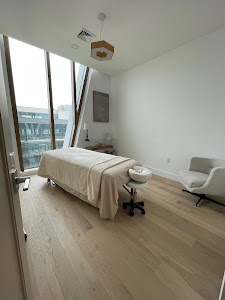Acupuncture for IBS
Acupuncture for IBS
What is IBS?

What is the meaning of IBS? Irritable Bowel Syndrome is a disorder affecting the gastrointestinal (GI) tract, specifically the large intestine. People with IBS often experience a range of symptoms, primarily related to digestion, that tend to flare up in cycles. These symptoms can include abdominal pain or cramping, bloating, gas, diarrhea, constipation, and mucus in the stool. Despite these symptoms, IBS does not cause permanent damage to the intestines, and there is no evidence that it increases the risk of more serious conditions, such as colon cancer.
Now we know what irritable bowel syndrome is, but the causes of IBS are not fully understood. Experts believe that a combination of factors may contribute to its development. These include problems with the communication between the brain and gut, increased sensitivity to pain in the digestive system, and disruptions in bowel motility. Psychological stress, hormonal changes, food intolerances, and infections may also play a role in triggering or worsening IBS symptoms.
Types of IBS
IBS is classified into different types based on the predominant bowel habit. These categories are important for determining the most effective IBS treatment approach:
- IBS with Constipation (IBS-C): This type is characterized by hard, lumpy stools and infrequent bowel movements. People with IBS-C may experience bloating and discomfort due to the buildup of stool in the colon.
- IBS with Diarrhea (IBS-D): Individuals with IBS-D primarily experience frequent, loose, or watery stools. This form of IBS can be particularly disruptive due to the urgency to use the bathroom and the discomfort that accompanies diarrhea.
- IBS with Mixed Bowel Habits (IBS-M): IBS-M is marked by alternating episodes of constipation and diarrhea. It can be challenging to manage because the symptoms fluctuate between extremes, making treatment for IBS more complex.
Each of these types requires a tailored approach to treatment, and many people with IBS explore alternative therapies like acupuncture for irritable bowel syndrome to help control their symptoms.
What Causes IBS?
The exact cause of IBS is unknown, but it is believed to be related to disturbances in the interaction between the brain and the gut. IBS triggers can affect how the intestines move, how they react to food, and how pain is processed in the GI tract. Several factors are thought to contribute to the development of IBS causes, including:
- Dysmotility: Problems with how the muscles in the intestines contract can lead to cramping and irregular bowel movements. In people with IBS, the intestines may contract too much or too little, resulting in either diarrhea or constipation.
- Visceral Hypersensitivity: Many people with irritable bowel syndrome have heightened sensitivity in the digestive system, making them more prone to experiencing pain or discomfort from normal digestive processes.
- Gut Bacteria: Research shows that individuals with IBS often have differences in their gut microbiome compared to those without IBS. An imbalance in gut bacteria may lead to digestive symptoms like bloating and irregular bowel movements.
- Food Intolerances: Certain foods can trigger IBS symptoms, especially foods that are difficult to digest, such as dairy or gluten. Other foods that are high in fat, sugar, or caffeine may also aggravate symptoms.
- Stress and Hormones: Emotional stress and hormonal changes, such as those that occur during menstruation, can exacerbate IBS symptoms. In some cases, psychological factors like anxiety and depression can make IBS worse. Some people need both acupuncture for IBS and anxiety, because one factor worsens the other.
These factors often interact with one another, creating a complex set of triggers and symptoms that vary from person to person. While medications and dietary changes can help manage IBS, many people turn to acupuncture for additional relief.
If you are worried about a IBS, make an appointment with us!
IBS Symptoms

- Dysmotility: Problems with how the muscles in the intestines contract can lead to cramping and irregular bowel movements. In people with IBS, the intestines may contract too much or too little, resulting in either diarrhea or constipation.
- Visceral Hypersensitivity: Many people with irritable bowel syndrome have heightened sensitivity in the digestive system, making them more prone to experiencing pain or discomfort from normal digestive processes.
- Gut Bacteria: Research shows that individuals with IBS often have differences in their gut microbiome compared to those without IBS. An imbalance in gut bacteria may lead to digestive symptoms like bloating and irregular bowel movements.
- Food Intolerances: Certain foods can trigger IBS symptoms, especially foods that are difficult to digest, such as dairy or gluten. Other foods that are high in fat, sugar, or caffeine may also aggravate symptoms.
- Stress and Hormones: Emotional stress and hormonal changes, such as those that occur during menstruation, can exacerbate IBS symptoms. In some cases, psychological factors like anxiety and depression can make IBS worse. Some people need both acupuncture for IBS and anxiety, because one factor worsens the other.
What Triggers Irritable Bowel Syndrome (IBS)?
Identifying and managing triggers is key to controlling IBS symptoms. Some common triggers include:
- Hormonal Changes: IBS symptoms in females differ because IBS symptoms worsen during menstruation.
- Certain Foods: Dairy products, gluten-containing foods, fatty foods, and caffeine are common triggers. Individuals with IBS often benefit from keeping a food diary to identify and avoid problematic foods.
- Stress: Emotional or mental stress can lead to digestive upset. Practices like relaxation techniques and mindfulness may help reduce stress-related irritable bowel syndrome flare-ups.

Can Acupuncture Treat Irritable Bowel Syndrome?
Acupuncture is a traditional Chinese medicine practice. Practitioner will insert thin needles into specific points on the body. It is believed that these points correspond to pathways of energy, or “qi,” that flow through the body. When these pathways become blocked, illness can occur. By stimulating acupuncture points for irritable bowel syndrome, for example, you can restore balance of your whole body.
Many people with IBS have turned to acupuncture as a complementary treatment to help manage their symptoms. Research suggests that natural remedies for irritable bowel syndrome may work by regulating the nervous system, reducing inflammation, and improving gut motility. In addition, acupuncture has been shown to have a calming effect on the body, which can help alleviate stress-related IBS symptoms.
At Pulse Acupuncture in Clifton, NJ, and Williamsburg, Brooklyn, acupuncture treatments are tailored to each individual’s needs. Whether a person has IBS-C, IBS-D, or IBS-M, the treatment focuses on reducing pain, regulating bowel movements, and getting relaxed. Acupuncture is often combined with other treatments, such as herbs for IBS or moxibustion, to enhance its effects.
Alternative Treatments for Irritable Bowel Syndrome (IBS) at Pulse Acupuncture
In addition to acupuncture, Pulse Acupuncture offers herbal treatments that are specifically designed to target the root causes of IBS. Chinese herbs have been used for centuries to treat digestive disorders and can help reduce bloating, cramps, and irregular bowel movements.
Herbal remedies are chosen based on the patient’s symptoms and the type of IBS they have. For instance, patients with IBS-C may be given herbs that promote bowel movements, while those with IBS-D may receive herbs that help to reduce diarrhea.
Both acupuncture and Chinese herbs are part of a holistic approach to managing IBS at our acupuncture clinic. These treatments are designed to support the body’s natural healing processes and provide long-term relief from IBS symptoms.
IBS is a chronic condition that can significantly impact a person’s quality of life. While traditional treatments such as dietary changes and medications can help manage symptoms, many people find additional relief through alternative therapies like affecting acupuncture points for IBS and Chinese herbal medicine.
At Pulse Acupuncture in Clifton, NJ, and Williamsburg, Brooklyn, patients receive fully personalized care that addresses the root causes of their IBS. Acupuncture treatments focus on restoring balance to the body’s energy, while Chinese herbs are used to support digestive health and alleviate discomfort. You can also get acupuncture for Crohn’s Disease and many other illnesses. If you’re looking for a natural, holistic approach to treatment, acupuncture and herbal medicine could be the solution.
-
Marina Doktorman, M.S., L.Ac., is an experienced acupuncturist who obtained her Masters of Acupuncture from the Tri-State College of Acupuncture in New York City in 2001. During her studies, she focused on Chinese Herbology, a branch of Traditional Chinese Medicine (TCM) that utilizes herbs to complement acupuncture treatments. Marina is licensed in both New York (NY) and New Jersey (NJ) and holds a Diplomate of Acupuncture from the National Certification Commission for Acupuncture and Oriental Medicine (NCCAOM), indicating her expertise in the field.
Why Pulse Acupuncture?

Experience
Marina Doktorman, L.Ac. has over 20 years of clinical experience.

RELAXATION
At Pulse Acupuncture, we aim to cultivate a spa-like environment.

Comfort
All of our needles are of the highest quality for painless insertion.
Patient Reviews in Brooklyn


I had the pleasure of working with Marina, Laryssa, and Jaesung, and they have all been absolutely amazing. Thanks to this incredible team, I can now sit, drive, walk, sleep comfortably, and function normally again. I truly don’t think I’d be where I am today without their care and expertise.
Pulse Acupuncture has become my go-to place for anything pain-related. The entire team is warm, compassionate, and professional, with outstanding bedside manners.
I highly recommend Pulse Acupuncture to anyone experiencing pain and looking for effective, non-invasive treatment. Truly life-changing! 😊











Marina is very accommodating, kind, and attentive, and her staff is a pleasure to deal with. I highly recommend Pulse.














Acupuncture has truly changed my life and has helped me in ways I didn’t even know were possible.
I started doing acupuncture to balance my hormones after 2 years of unsuccessful fertility treatments. When I started seeing Marina, my periods were starting to be regular and I was dealing with a few different symptoms which we started treating right away (constipation, random headaches, body aches)… in the last 3 years I have not been sick (no flu, have never tested positive for COVID) - Marina even treated me for allergies more than a year ago during an allergy episode in changing seasons.
Also want to mention Larissa as I started seeing her in Marina’s beautiful office and she’s also contributed to my wellness journey. Acupuncture is my favorite wellness practice, I see them regularly and have never felt better. I sometimes just tell them whatever I’m thinking/feeling knowing they will stick some needles in different places of my body and I come out floating and feeling so relaxed.




Excellent service- great results- highly recommended ~!





Marina is not only incredibly knowledgeable, but also very calming and has great bedside manners. If you're looking for a fantastic acupuncturist I can't recommend her enough!!













After 10 minutes of the procedure, you get into a different reality. Marina is knowledgeable, answers all the questions. After the procedure, the skin of the face glows, the body becomes lighter by a couple of pounds. I've been looking for such a procedure and state of mind for a long time.


I am beyond grateful to Marina, because after trying so many things, I almost lost hope. highly recommend Pulse Acupuncture and Marina for anyone seeking relief from pain or other health concerns.
The acupuncture sessions themselves are incredibly relaxing and therapeutic. Marina's gentle touch and precise needle placement always leave me feeling calm and rejuvenated. She also incorporates other techniques, such as cupping, which have been very beneficial for my overall health and wellbeing.
In addition to her skill as an acupuncturist, Marina is also a wonderful person to work with. She is warm, friendly, and genuinely cares about her clients' wellbeing. I always leave our sessions feeling refreshed and uplifted, both physically and mentally.
Overall, I highly recommend Pulse Acupuncture and Marina for anyone looking for high-quality acupuncture and personalized care. Thank you, Marina, for your exceptional service and dedication to helping others achieve optimal health!
Acupuncture for IBS - FAQ
What is Irritable Bowel Syndrome (IBS)?
Irritable Bowel Syndrome (IBS) is a common gastrointestinal disorder characterized by a combination of symptoms like abdominal pain, bloating, gas, diarrhea, and constipation. It’s a chronic condition that affects the large intestine and requires long-term management. The exact cause of IBS isn’t known, but it’s believed to involve a mix of muscle contractions in the intestine, nervous system abnormalities, inflammation, severe infection, and changes in gut bacteria.
Can acupuncture help with IBS symptoms?
Yes, acupuncture may help alleviate IBS symptoms. Studies suggest that acupuncture can reduce abdominal pain, regulate bowel movements, and improve overall gastrointestinal function. It may work by modulating the nervous system, reducing stress, and balancing hormones that affect gut activity.
Is acupuncture safe for IBS patients?
Acupuncture is generally considered safe when performed by a qualified practitioner using sterile needles. Side effects are rare but can include minor bleeding, bruising, or soreness at needle sites. Always consult with a healthcare provider before starting any new treatment.
Are there any risks associated with acupuncture for IBS?
Risks are minimal when acupuncture is performed correctly. Possible risks include infection (if needles are not sterile), organ injury (rare and due to improper technique), and minor side effects like dizziness or nausea.
Contact us
Acupuncture therapy at Pulse Acupuncture Practice, at Clifton, NJ and Williamsburg, Brooklyn, NYC offers unique combination of various cupuncture types for healing on all levels: emotional, spiritual and physical by integrating ancient wisdom of energy healing with modern acupuncture techniques.


